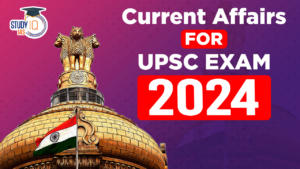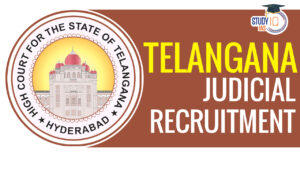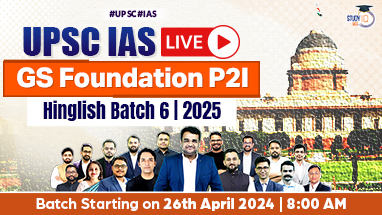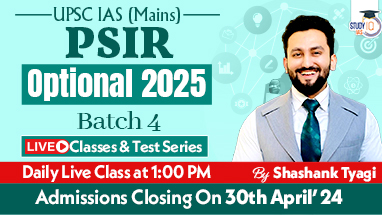Daily Current Affairs for UPSC 2023
Q) Recently seen in news, the World Economic Outlook report is released by which one of the following organization?
- World Bank
- International Monetary Fund
- Organisation for Economic Co-operation and Development
- Economic Cooperation Organization
Daily Current Affairs for UPSC – 31 January 2023
Explanation:
- Option (2) is correct: World Economic Outlook (WEO) is a bi-annual publication by the International Monetary Fund (IMF) that provides analysis and forecasts of the global economic situation and prospects. The report typically includes a global outlook, as well as regional and country-specific analyses, and provides insights into key economic and financial trends, risks, and policy challenges facing the world economy. The IMF releases the WEO twice every year, in April and October, apart from updating it twice-in January and July.
- According to the IMF’s global growth is now projected to fall to 2.9% in 2023 before rising to 3.1% in 2024.
- China, Russia, the US, Germany, and Italy are some of the key economies that have seen the most significant upward revisions in their 2023 GDP forecasts.
- Global inflation is set to fall from 8.8% in 2022 to 6.6% in 2023 and 4.3% in 2024, stated the IMF.
- Monetary tightening all across the world-higher interest rates drag down overall demand for goods and services, which in turn slows down inflation.
- In 2023, advanced economies are expected to have an inflation of 4.6% while emerging economies will continue to face an inflation of 8.1%. India will stay the world’s fastest growing major economy in 2023 and 2024.
- Growth in India is set to decline from 6.8% in 2022 to 6.1% in 2023 before picking up to 6.8% in 2024, with resilient domestic demand despite external headwinds.
Q) With reference to Economic Survey 2022-23, consider the following statements:
- The Current Account Deficit has decreased in last one year due to lowering trade gap.
- India’s share of world commercial services exports has doubled in the last five years.
- Unified Payment Interface (UPI)-based transactions grew only by 85 percent in value terms in the last three years.
Which of the statements given above are not correct?
- 1 and 2 only
- 2 and 3 only
- 1 and 3 only
- 1, 2 and 3
Explanation:
- Statement 1 is incorrect: As per Economic Survey 2022-23, India’s economy to grow 6.5% in 2023-24, compared to 7% this fiscal and 8.7% in 2021-22. Rupee depreciation could persist with the likelihood of further interest rate hikes by the US Fed. Current account deficit (CAD) may continue to widen as global commodity prices remain elevated, economic growth momentum stays strong. If CAD widens further, rupee may come under depreciation pressure. Current account deficit (CAD) widened to 4.4% of the GDP in the quarter ending September, from 2.2% of the GDP during the April-June period due to a higher trade gap, according to the latest Reserve Bank of India (RBI) data. However, India has sufficient forex reserves to finance CAD and intervene in forex market to manage rupee volatility.
- Statement 2 is incorrect: Services sector is expected to grow at 9.1% in FY23, as against 8.4% (YoY) in FY22. India was among the top ten services exporting countries in 2021, with its share in world commercial services exports increasing from 3 per cent in 2015 to 4 per cent in 2021. The growth in exports has moderated in second half of current fiscal. Slowing world growth, shrinking global trade led to loss of export stimulus in the second half of current year.
- Statement 3 is incorrect: Unified Payment Interface (UPI)-based transactions grew in value (121 per cent) and volume (115 per cent) terms, from 2019-22, paving the way for its international adoption. The RBI has projected headline inflation at 6.8% in FY23, outside its comfort zone of 2% to 6%. ‘Entrenched Inflation’ may prolong the tightening cycle and therefore borrowing costs may stay higher for longer. Periodic Labour Force Survey (PLFS) showed that urban unemployment rate for people aged 15 years and above declined from 9.8% in the quarter ending September 2021 to 7.2% one year later. Fall in unemployment rate is accompanied by an improvement in the labour force participation rate.
Q) Consider the following statements about Neglected Tropical Diseases (NTD):
- NTDs are solely caused by bacteria and parasites.
- Both the ‘chagas disease’ and ‘chromoblastomycosis’ are NTDs.
- WHO has set a target to end NTDs by the year 2050.
Which of the statements given above is/are correct?
- 1 and 2 only
- 2 only
- 1 and 3 only
- 1, 2 and 3
Explanation:
- Statement 1 is incorrect: Neglected Tropical Diseases (NTD) are a diverse group of 20 conditions mainly prevalent in tropical areas — caused by various pathogens, including viruses, bacteria, parasites, fungi and toxins. NTDs are especially common in tropical areas where people do not have access to clean water or safe ways to dispose of human waste. Neglected Tropical Diseases (NTD) continue to disproportionately impact the most impoverished members of the international community, said a new WHO report.
- Statement 2 is correct: NTD affects 1 billion people worldwide, and the poorest and most vulnerable communities suffer the most. India has the world’s largest absolute burden of at least 10 major NTDs, including hookworm, dengue, lymphatic filariasis, leprosy, visceral leishmaniasis or kala-azar and rabies. NTDs includes: Buruli ulcer, Chagas disease, dengue and chikungunya, dracunculiasis (Guinea-worm disease), echinococcosis, foodborne trematodiases, human African trypanosomiasis (sleeping sickness), leishmaniasis, leprosy (Hansen’s disease), lymphatic filariasis, mycetoma, chromoblastomycosis and other deep mycoses, onchocerciasis (river blindness), rabies, scabies and other ectoparasitoses, schistosomiasis, soil-transmitted helminthiases, snakebite envenoming, taeniasis/cysticercosis, trachoma, and yaws and other endemic treponematoses.
- Statement 3 is incorrect: Controlling the vectors (e.g., mosquitoes, black flies) that transmit these diseases and improving basic water, sanitation, and hygiene are highly effective strategies against these NTDs. Innovation in diagnostics, treatment and prevention will help create solutions that are effective, relevant, locally feasible, and sustainable to treat NTD. SDG Target 3.3 is to end neglected tropical diseases NTDs by 2030.
Q) With reference to President Address to legislature, consider the following statements:
- The president addresses the first meeting of every parliamentary session.
- No discussion is allowed on the motion of thanks by the members of parliament.
- The failure to pass a motion of thanks amounts to defeat for the government.
Which of the statements given above is/are correct?
- 1 and 2 only
- 2 and 3 only
- 3 only
- 1 and 3 only
Explanation:
- Statement 1 is incorrect: Under Article 87 of the Indian Constitution, there are two special occasions on which the President (or the Governor) addresses a joint sitting:
- To address the opening session of a new legislature after a general election
- To address the first sitting of Parliament (or legislative assembly) each year. A session of a new or continuing legislature cannot start without fulfilling this requirement.
- Statement 2 is incorrect: After the address, both houses of the Parliament move a motion to thank the President for his/her speech. MPs are then provided an opportunity to debate and raise concerns on certain issues. These concerns are then addressed by the Prime Minister, who also replies to the motion of thanks. The motion is then put to vote and MPs can express their disagreement on the motion by moving amendments to the motion.
- Statement 3 is correct: The President (or the Governor) is obliged to perform the constitutional duty of delivering an address to the legislature. However, there are instances when Governors deviate from the text of the speech prepared by the government. Till now, no President has deviated from the text of the speech. The Motion of Thanks must be passed in the House. Otherwise, it amounts to the defeat of the government. It is one of the ways through which the Lok Sabha can also express a lack of confidence in the government.
Q) Consider the following statements about ‘Sena spectabilis’:
- It is a type of tree that is both deciduous and evergreen.
- It is an exotic invasive species that adversely affects the germination of native species.
- It is categorised as ‘Least Concern’ under the IUCN Red List.
Which of the statements given above is/are correct?
- 1 and 2 only
- 2 and 3 only
- 3 only
- 1, 2 and 3
Explanation:
- Statement 1 and 2 are correct: Senna spectabilis is a deciduous tree that belongs to the Fabaceae family and is grown as an ornamental plant across tropical America. It can grow 7-18 metres tall; is evergreen in climates with rain all year round, but can become deciduous in some regions, and produces yellow flowers. Sena spectabilis is an exotic invasive plant that causes ecological or economic harm in a new environment where it is not native. It adversely affects the germination and growth of native species.
- Statement 3 is correct: The Nodal Centre for Biological Invasions (NCBI) at the Kerala Forest Research Institute (KFRI) has come out with a management plan to eradicate Senna spectabilis. The thick foliage of the tree arrests the growth of other indigenous tree and grass species. Thus, it causes food shortages for the wildlife population, especially herbivores. It is categorised as ‘Least Concern’ under IUCN Red List.


 Current Affairs 25th April 2024 for UPSC...
Current Affairs 25th April 2024 for UPSC...
 Editorial of the day (25th Apr): UK's Rw...
Editorial of the day (25th Apr): UK's Rw...
 Telangana Judicial Recruitment Notificat...
Telangana Judicial Recruitment Notificat...

















